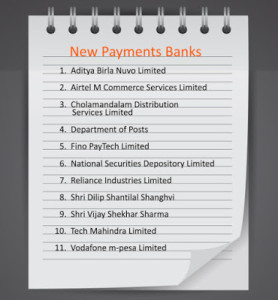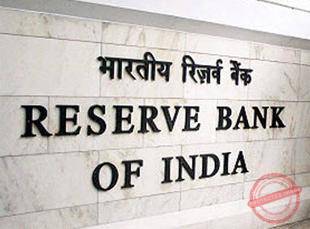The Reserve Bank of India granted ‘in-principle’ approval to 11 entities to set up payments banks under the Guidelines for Licensing of Payments Banks issued on November 27, 2014 proposed such licences ‘on tap’ in future.
“In-principle” Approval:
- The “in-principle” approval granted will be valid for a period of 18 months, during which time the applicants have to comply with the requirements under the Guidelines and fulfil the other conditions as may be stipulated by the Reserve Bank.
- On being satisfied that the applicants have complied with the requisite conditions laid down by it as part of “in-principle” approval, the Reserve Bank would consider granting to them a licence for commencement of banking business.
- A total of 41 applicants had applied for payments banks from them only 11 applicants has been selected by External Advisory Committee (EAC) under the Chairmanship of Dr. Nachiket Mor, Director, Central Board of the Reserve Bank of India, Internal Screening Committee (ISC) and finalized by Committee of the Central Board (CCB).
11 applicants includes:
 1. Aditya Birla Nuvo Limited.
1. Aditya Birla Nuvo Limited.
2. Airtel M Commerce Services Limited.
3. Cholamandalam Distribution Services Limited.
4. Department of Posts.
5. Fino PayTech Limited.
6. National Securities Depository Limited.
7. Reliance Industries Limited.
8. Shri Dilip Shantilal Shanghvi.
9. Shri Vijay Shekhar Sharma
10. Tech Mahindra Limited.
11. Vodafone m-pesa Limited.
Operations to be made by 11 Applicants (Payment Banks):
- Payment banks allow mobile firms, supermarket chains, and others to cater to individuals and small businesses.
- The Payments Bank will be set up as a differentiated bank and shall confine its activities to acceptance of demand deposits, remittance services, Internet banking and other specified services.
- Payments Banks will initially be restricted to holding a maximum balance of Rs. 1 lakh per individual customer.
- They will be allowed to issue ATM/debit cards as also other prepaid payment instruments, but not the credit cards.
- These banks can also distribute non-risk sharing simple financial products like mutual funds and insurance products.
- They will not be allowed to undertake lending services and non resident Indians will not be allowed to open accounts.
AffairsCloud Recommends Oliveboard Mock Test
AffairsCloud Ebook - Support Us to Grow
Govt Jobs by Category
Bank Jobs Notification





